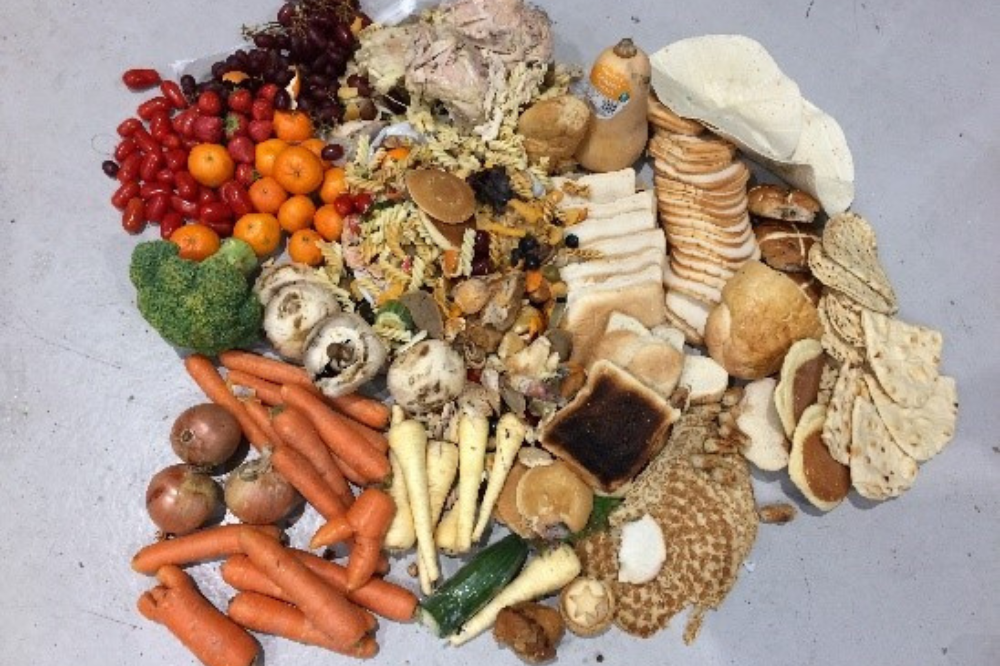6-12 March 2023
During Food Waste Action Week we find out how we can reduce our food waste, recycle food waste and reuse food waste to help save the environment and keep money in our pockets.
Did you know?
- Food waste from our UK homes produces roughly 25million tonnes of CO2 every year - so by reducing our food waste we also reduce unwanted gas emissions that is damaging to the environment.
- Around 4.5 million tonnes of edible food is thrown away each year by UK households. Shockingly, 25% of this wasted food is due to cooking, preparing or serving too much - this costs UK households £3.5 billion each year.
The Food Waste Week campaign from WRAP will show us how we can save the environment, and save ourselves money, by making the most of the food we buy.
Take action to reduce our food waste
Through our West Sussex waste audits we found that a staggering 41.5% of our average waste bin is made up of food waste.
This photo shows an example of what was thrown away in just two weeks of one household's waste. Yet up to 70% of that waste can actually be avoided!
By finding ways to reduce our food waste in the first place, and composting or sharing our surplus food, we will save ourselves money, save the environment, and support our communities too.
We could be well on the way to saving an average of £700 a year. Read our top tips below:
Top tips for reducing or recycling food waste at home
- Think before you shop
Decide on a weekly food menu so that you know what you need, how many of the ingredients you have already, and how much more is needed. - Set your budget and take a shopping list
It will keep you focused on what you really need to buy. - Find the best place to store your food
For example most fruit and veg can be stored in the fridge (except bananas and pineapples). But don’t store onions and potatoes together with fruit - because they release ethylene gas, they can cause each other to spoil faster. Store your potatoes in a cool dark place to help prevent sprouting. Also to prevent slimy residue from accumulating in your bag of leafy greens, pop a paper towel inside to soak up excess moisture. Visit the Love Food Hate Waste website for more top tips. - Understand the date labels
Use By is about food safety, Best Before is about food quality. And trust your gut instinct - does it look/smell off? - Eat all edible parts of your food
There's no need to peel your carrots or potatoes, or throw away outer cauliflower leaves, just give them a wash. They are packed with goodness. - Freeze it
Every bit of wasted left over food has an environmental impact. Why not freeze it for another time. For example If you don't eat much bread, you can keep the loaf in the freezer and just take out the slices you need that day - no waste, save money. - Compost it.
In addition to reducing food waste, home composting is the most environmentally-friendly way of recycling kitchen waste. You can compost any uncooked food (but no meat or fish) and eggshells. Buy a composter at a reduced price
For more top tips, Visit the Love Food, Hate Waste website. It's packed with information and inspiration to help you plan meals, make delicious food and reduce your food waste and food bills.
Community food sharing - reusing food waste
By sharing our surplus food we can reduce food waste and help those in need. See some options below.
1. Food banks
Donate unwanted food to the Horsham District Foodbank.
Donate Food
2. The Community Fridge scheme
This scheme offers excess food from local businesses, supermarkets and allotments that would otherwise be wasted and makes it available to everyone in the community to take. There are a number of pop-up fridges in the Horsham area on Saturdays from 10-11am, and in Steyning (BN44) on Mondays and Thursdays.
Find your nearest Community Fridge
3. Check out OLIO, the food waste app
This clever app connects neighbours with each other and with local businesses so surplus food can be shared, not thrown away. This could be food nearing its sell-by date in local stores, spare home-grown vegetables, bread from your baker, or the groceries in your fridge when you go away.
Visit the Olio webpage

